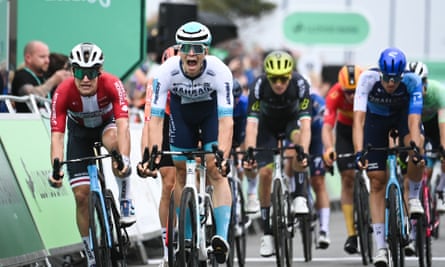Superficially, the final stage of this year’s Tour of Britain into a windswept Felixstowe had a routine look, a chaotic bunch sprint won by the Slovenian Matevz Govekar, and Steve Williams of Wales straightforwardly sealing overall victory. But what preceded the sprint was 158km of anarchic racing, with a strong southerly splitting the peloton repeatedly amid a frantic series of attacks and chases.
The wind was at its most damaging between Framlingham, Aldeburgh and Wickham Market a couple of hours from the finish, blowing from the side and prompting the DSM team to increase the pace so violently that one of their number misjudged a corner in Framlingham and hit the pavement. With the peloton splitting in the crosswind, the first surge dislodged the triple stage winner Paul Magnier and – initially at least – the rider in fourth overall, Tom Donnenwirth; a second, prompted by Ineos’s Tobias Foss, saw off Julian Alaphilippe.
A 35-strong lead group emerged approaching the bonus sprint at Aldeburgh, with Magnier and most of his teammates trailing behind. Worse was to follow for Magnier, who crashed and abandoned, depriving him of a certain victory in the points jersey.
To spice things up further, the organisers had included three intermediate sprints with time bonuses; Donnenwirth was the main beneficiary after a desperate chase to make the front group. He became involved in a duel for the bonuses with Mark Donovan and his Q36.5 team and with Joe Blackmore, coming close to crashing on a couple of occasions, but gleaning enough seconds to edge Donovan off the podium.

That set the stage for a final sprint contested by a peloton of 58, with Williams’s teammate Ethan Vernon coming close yet again in fourth place; Govekar timed his sprint perfectly to come round Vernon’s lead-out man Jake Stewart, holding off a late surge from the Dane Rasmus Pedersen, who was just ahead of Ineos’s near‑veteran Ben Swift, a stage winner in this race way back in 2009.
It was a hectic end to a triumphant week for Williams, who added his home Tour to his increasing list of stage race wins – the Tour Down Under, the Arctic Race of Norway, the Ronde de l’Isard – and a major one‑day Classic in this year’s Flèche Wallonne. Home wins have been a rarity since the British Tour was relaunched in 2004, and the 28-year-old from Aberystwyth joins Sir Bradley Wiggins (2013) and Steve Cummings (2016) on a short but prestigious list, thanks to his wins on the race’s toughest stages into Redcar and Barnsley.
A promising under-23 rider who began his career at the JLT-Condor team in 2016, Williams’s career has blossomed of late – his first World Tour win came only in 2022 in a stage of the Tour of Switzerland – but that is largely down to a knee injury that ruined his first couple of years with the Bahrain-Merida team.
He can count himself lucky to have landed at the Israel-Premier Tech squad, who picked him up at the end of 2022 after the team he had signed for, B&B Hotels, collapsed during that winter; the move has worked well for both parties.
after newsletter promotion
Williams was preceded on the podium by none other than Mark Cavendish, who was given an official farewell by British Cycling in his retirement year, appropriately enough as this race was where he cut his teeth against professional opposition in 2005. The race has always been a showcase for young British talent and this year was no exception, with three 21‑year‑olds making their mark: the Scot Oscar Onley finishing second, Blackmore taking fifth and Callum Thornley the best climber’s prize.

Comments (…)
Sign in or create your Guardian account to join the discussion